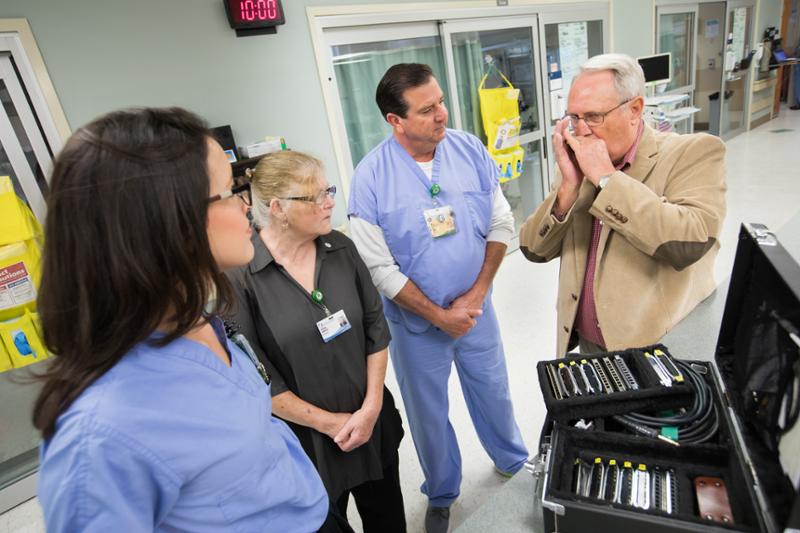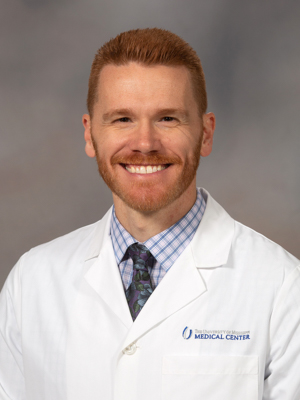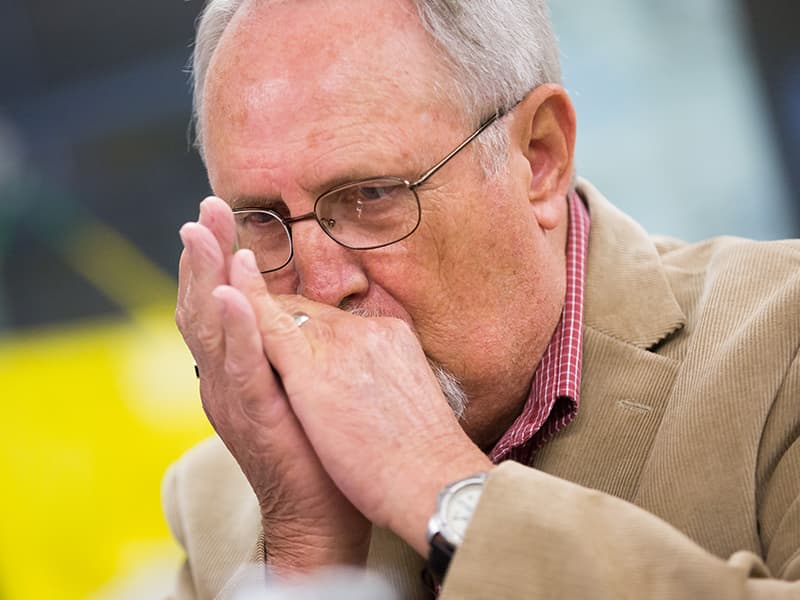Screening, early detection make lung cancer ‘highly curable’
NOTE: This article originally appeared in the December 2017 issue of CONSULT, UMMC's monthly electronic newsletter. To have CONSULT, and more stories like this, delivered directly to your inbox, click here to subscribe.
Preventing lung cancer is the first action doctors recommend.
Catching it early is the second.
At the University of Mississippi Medical Center, this approach often starts with a medical caregiver’s advice to quit smoking and for those who are or were longtime smokers to have a screening process called low-dose computed tomography.

“If you do not have lung cancer, quitting smoking, even after decades of use results in substantial reductions in risk after just 3 to 5 years of abstinence,” said Dr. Thomas Payne, professor of otolaryngology and director of the ACT Center for Tobacco Treatment, Education and Research. “For those who have received a serious diagnosis, like lung cancer, there is a natural reaction to believe the worst possible outcome will occur.
“However, quitting tobacco even at this late date significantly improves the impact of cancer treatment and can increase your odds of survival beyond 5 years from about 31 percent to 67 percent.”
Quitting often results in an improved quality of life, including reduced stress levels, freedom from addiction, and substantial financial savings, he said.
UMMC Cancer Institute members know smoking is the primary risk factor for this cancer that kills almost 2,000 Mississippians annually. Those who haven’t quit or who quit within the past 15 years may be eligible for LDCT, a tool to help detect cancer before symptoms show up.
That was the case for David Bowman, 66, of near Pelahatchie. He attributes his current cancer-free life to LDCT, approved three years before his diagnosis. It helped physicians detect a small cancer in time to remove it surgically without the need for chemotherapy or radiation therapy.

“Do it: You’ve got nothing to lose and everything to gain,” Bowman said. “You could end up like me and be blessed with early detection. By the time symptoms show up, it’s too late to get the results I have.”

“Lung cancer is the No. 1 cancer killer in America, largely because we don’t have a good screening program,” said Dr. Jacob Moremen, assistant professor of surgery, member of the UMMC Cancer Institute’s Interdisciplinary Thoracic Team and Bowman’s surgeon. “Breast, colon and cervical cancers all saw a marked decline in deaths after screening began.”
Moremen said the screening has another effect on many people: They quit smoking. Smoking is the overwhelming major risk factor for lung cancer.
“A lot of people have a hard time with the reality of lung cancer because they can’t see it, can’t feel it,” he said. “Something more tangible helps.”
Payne said getting help increases the odds a person can quit using tobacco.
“At the ACT Center, we offer a six-week program with a proven record of effective treatment that has been helping tobacco users quit for over 15 years,” he said.
Dr. John Ruckdeschel, UMMC Cancer Institute director and an internationally recognized lung cancer expert, said it took decades of study to find a reliable test that reduced lung cancer mortality. The National Lung Screening Trials reported results of that research in 2011.
“The data is clear that we can reduce lung cancer mortality by 20 percent, far above what we can do with most of our therapies,” he said. “The downside is there are a lot of scans that find benign nodules and safely sorting them out is why we need careful review by an interdisciplinary team.”
A Pelahatchie resident, Bowman said his experience with LDCT began in January 2015 when his family doctor suggested it. Bowman had smoked for 40 years before quitting in 2011.
“Just before my 60th birthday I quit for the last time,” he said.
The screening then cost $150. Now Medicare pays for it.
“I paid my $150 and got my full scan,” Bowman said. “It took five minutes. A day or two later they called and said they found a nodule but wanted to watch it for now.”
He continued with scans in July 2015 and January and July 2016, with no change. He and his doctors decided to wait a year. In July 2017, the nodule was found to have grown.
Bowman’s case was presented to the Interdisciplinary Thoracic Cancer Team, whose members arranged a PET scan and biopsy. Since the cancer was small, surgery was the only treatment he needed.
Early-stage lung cancers have few or even no symptoms. Nodules detected in the LDCT scans are reviewed by radiologists. Those that raise concerns, like Bowman’s, are referred to the team.
The team reviews cases with surgeons, medical and radiation oncologists, radiologists, pathologists, pulmonologists and others each week, debating the best course of treatment for each new patient.
“In the case of a small nodule like his (Bowman’s), it usually will come to us (surgeons), unless they’re really unhealthy,” Moremen said.
The team concept used at the UMMC Cancer Institute means specialists can set up appointments for the patient, in the correct order, and often for the same day.
“A lot of places don’t run that way: Patients get pinged round to six different appointments to doctors who aren’t talking to each other and the patient knows it,” Moremen said. He said with the team approach, patients also have the assurance no one is making a recommendation in a vacuum.

Life after cancer is good, but not the same. Bowman, who retired in 2003 after 32 years at the rank of chief master sergeant in the Mississippi Air National Guard, remarried about 18 months ago. He once played drums in area bands; now he prefers the cross harp, a blues-style harmonica.
He’s back to playing with the Back Forty Band, but with a few changes.
“My voice is not as good as it was, but I can still carry a tune,” he said. “I have to look for places that don’t allow smoking now.”
The U.S. Preventive Services Task Force recommends low-dose CT screening for:
• Adults with a 30-pack-year history of smoking (one pack a day for 30 years or two packs a day for 15 years)
• Individuals 55 to 77
• Those who currently smoke or who have quit within the last 15 years
Individuals who think they are candidates for this screening should discuss it with their doctor. For more information about lung cancer screenings, visit /Healthcare/Cancer/Cancer_Screening/Lung%20Cancer%20Screening%20and%20Diagnosis.html; for more information about smoking cessation, visit http://act2quit.org/.



